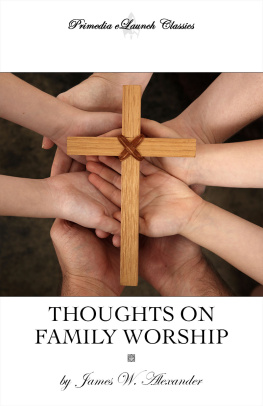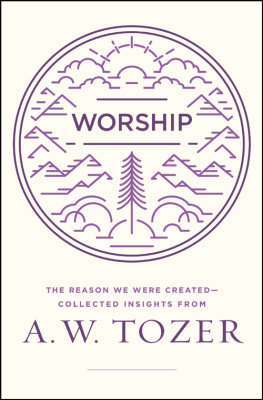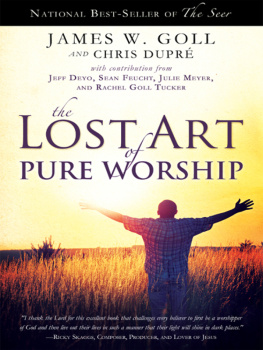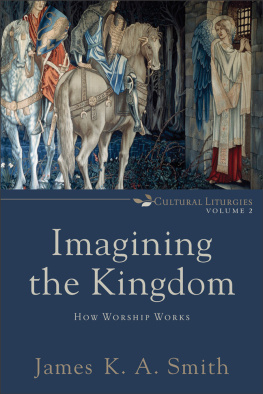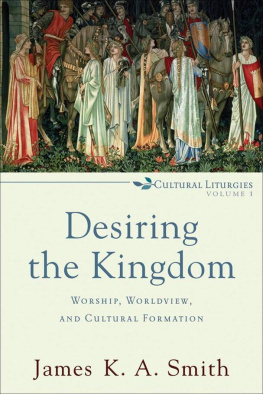James W Alexander - Thoughts on family-worship
Here you can read online James W Alexander - Thoughts on family-worship full text of the book (entire story) in english for free. Download pdf and epub, get meaning, cover and reviews about this ebook. City: Philadelphia, year: 1847, publisher: Presyterian Board of Publication, genre: Religion. Description of the work, (preface) as well as reviews are available. Best literature library LitArk.com created for fans of good reading and offers a wide selection of genres:
Romance novel
Science fiction
Adventure
Detective
Science
History
Home and family
Prose
Art
Politics
Computer
Non-fiction
Religion
Business
Children
Humor
Choose a favorite category and find really read worthwhile books. Enjoy immersion in the world of imagination, feel the emotions of the characters or learn something new for yourself, make an fascinating discovery.
- Book:Thoughts on family-worship
- Author:
- Publisher:Presyterian Board of Publication
- Genre:
- Year:1847
- City:Philadelphia
- Rating:4 / 5
- Favourites:Add to favourites
- Your mark:
- 80
- 1
- 2
- 3
- 4
- 5
Thoughts on family-worship: summary, description and annotation
We offer to read an annotation, description, summary or preface (depends on what the author of the book "Thoughts on family-worship" wrote himself). If you haven't found the necessary information about the book — write in the comments, we will try to find it.
Thoughts on family-worship — read online for free the complete book (whole text) full work
Below is the text of the book, divided by pages. System saving the place of the last page read, allows you to conveniently read the book "Thoughts on family-worship" online for free, without having to search again every time where you left off. Put a bookmark, and you can go to the page where you finished reading at any time.
Font size:
Interval:
Bookmark:
CONTENTS
Chapter 1
The Nature, Warrant, and History of Family Worship
F amily Worship, as the name imports, is the joint worship rendered to God, by all the members of one household.
There are some duties so plain, that they are rather assumed, than commanded, in the word of God; and the number of such is greater than might be supposed on a superficial examination. This is especially true of those duties which belong to the family-relation; as for example those of the mother to her babe. They are subjected to regulation, and are objects of frequent allusion; but are not incorporated into the law of commandments. We are not to wonder, therefore, if we find, even in the New Testament, no separate and explicit injunction to worship God in the family; as little do we find any command to pray when we preach the word, or when death has visited our dwellings. These are things which it was safe to leave with the pious sentiment of Christians: and yet they are not the less characteristic of good men, nor less universal in the church.
The new-horn soul must pray, even as the new-born child must breathe. And wherever the grace of prayer is shed forth in the soul, it will flow out in certain acts. There is an irresistible impulse to pray for those whom we love; and not only to pray for them, but with them. There is a natural as well as a gracious prompting, to pray with those who are near to us. Prayer is a social exercise. The prayer which our Lord taught his disciples, bears this stamp on every petition. It is this principle which leads to the united devotions of church-assemblies, and which immediately manifests itself in Christian families.
If there were but two human beings upon earth, they would be drawn, if they were of sanctified hearts, to pray with one another. Here we have the fountain of domestic worship. Time was, when there were but two human beings upon earth; and we may feel assured, that they offered adoration in common. This was the Family Worship of Paradise. It is, therefore, no profane fiction, but a pious endeavor to shadow forth what undoubtedly took place, when the great poet represents Adam and Eve as addressing their morning thoughts in concert to God:
Soon as they forth were come to open sight
Of dayspring and the sun, who, scarce uprisen
With wheels yet hovring oer the ocean brim,
That parallel to the earth his dewy ray,
Discovering in wide landscape all the east
Of paradise and Edens happy plains,
Lowly they bowd adoring, and began
Their orisons, each morning duly paid
In various style; for neither various style
Nor holy rapture wanted they to praise
Their Maker, in fit strains pronouncd or sung
Unmeditated, such prompt eloquence
Flowd from their lips, in prose or numerous verse.
More tuneable than needed lute or harp
To add more sweetness; and they thus began.
That religion should specially pertain to the domestic relation, is not at all wonderful. The family is the oldest of human societies; it is as old as the creation of the race. Men were not drawn together into families by a voluntary determination, or social compact, according to the absurd figment of infidels: they were created in families. This has been recognized in every covenant; and the gospel, so far from destroying, has bound more closely, and sanctified the family. By circumcision, under the Old Testament, and by Baptism, under the New, God has perpetually reminded his people of the honor set on this connection.
It is not our purpose to make any ingenious efforts to force into our service the history of the Old Testament, or to search for Family Worship in every age of the world. That it has existed in every age, we do not doubt; that the Old Testament was intended to communicate this fact, is not so clear. But, without any indulgence of fancy, we cannot fail to discern the principle of Family Worship, appearing and reappearing, as a familiar thing, in the remotest periods.
While all the church of God was in the ark, the worship was plainly Family Worship; and after the subsiding of the waters, when Noah builded an altar unto the Lord, it was a family-sacrifice which he offered. The service of Job in behalf of his children was a perpetual service: he sent and sanctified them, and rose up early in the morning, and offered burnt-offerings according to the number of them all: thus did Job continually ; or, as it is in the Hebrew, all the days. The book of Deuteronomy is full of family-religion; as an example of which we may specially note the sixth chapter. The passover, as we shall observe more fully in the sequel, was a family-rite.
Everywhere in the Old Testament good men take cognizance of the domestic tie, in their religion. Joshua, even at the risk of being left with none but his family, will adhere to God: As for me and my house, we will serve the Lord.
The modern Jews, in every part of the world, keep up a domestic service. In their Liturgy this is provided for, at least as voluminously as in any Christian ritual. As the subject is seldom treated, a few additional particulars will not be out of place; and though these relate primarily to the German and Polish Jews, they are substantially true of all others. The Hebrew Liturgy fills six or seven volumes. One of these is devoted to the Daily Prayers . They are read in the Synagogue, but are also read at home by all who are considered devout. In the morning it is the duty of every Israelite, as soon as he rises, to wash himself, and repeat a blessing. He then puts on the garment with fringes, and repeats another blessing. He then proceeds with a service, including prayers, psalms, and other portions of Scripture, to which large additions are made on Sabbaths and festivals. This must all take place before breakfast. The evening Daily Service, though shorter, is of the same kind. During the morning prayer, except on Sabbaths and holidays, the Jews make use of the Tephilin , or phylacteries. The extent of these devotions may be understood, when we add, that for the Sabbath they occupy more than fifty octavo pages.
In the New Testament, the traces of family-religion are not less obvious. We gladly borrow the animated language of Mr. Hamilton of London, and ask: Do you envy Cornelius, whose prayers were heard, and to whom the Lord sent a special messenger to teach him the way of salvation? He was a devout man, one who feared God with all his house , and prayed to God always; and who was so anxious for the salvation of his family, that he got together his kinsmen and near friends, that they might be ready to hear the apostle when he arrived, and share with himself the benefit. could not but have manifested itself in daily household devotion.
Our records of primitive Christianity are so much distorted and corrupted by a superstitious tradition, that we need not be surprised to find a simple and spiritual service such as this, thrown into the shade by sacerdotal rites. Yet we discern enough to teach us, that believers of the first ages were not neglectful of Family Worship. Many of the authorities, cited by Bishop Mant, in his work on Daily Prayer, are quite as cogent in favor of a domestic service, as of a daily office in the church-edifice, which some are so zealously reviving.
In general, says Neander, in a work not published among us, they followed the Jews, in observing the three seasons of day, nine, twelve, and three oclock, as special hours of prayer; yet they did not use these in a legal manner, such as militated against Christian liberty; for Tertullian says, in regard to times of prayer, nothing is prescribed, except that we may pray at every hour, and in every place. The Christians began and closed the day with prayer. Before meals, before the bath, they prayed; for, as Tertullian says, the refreshment and nourishment of the soul must precede the refreshment and nourishment of the body; the heavenly before the earthly. When a Christian from abroad, after brotherly reception and hospitality in the house of a brother Christian, took his leave, he was dismissed from the Christian family with prayer; because, said they, In thy brother, thou hast beheld thy Lord. For every affair of ordinary life they made preparation by prayer.
Next pageFont size:
Interval:
Bookmark:
Similar books «Thoughts on family-worship»
Look at similar books to Thoughts on family-worship. We have selected literature similar in name and meaning in the hope of providing readers with more options to find new, interesting, not yet read works.
Discussion, reviews of the book Thoughts on family-worship and just readers' own opinions. Leave your comments, write what you think about the work, its meaning or the main characters. Specify what exactly you liked and what you didn't like, and why you think so.

